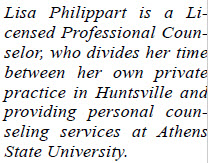The Concept of Self
 By: Lisa Philippart
By: Lisa Philippart
We all have a sense of self. Whether that sense of self is positive or negative is based upon our experiences in life and our perceptions and assessment of ourselves. If our self-assessment was always accurate, I would have no need to write this article. However, the problem is that our perception of ourselves is often distorted. In psychology, there are several terms that are used, sometimes incorrectly and interchangeably, that relate to the self. These words are self- concept, self-esteem, self-efficacy, and self-confidence. Let’s take a look at each of these expressions individually to gain a clearer understanding of how they affect who we think and feel we are.
 What is self-concept? Self-concept is a factual description of how you perceive yourself. If your perception is distorted, then this description may not be an accurate picture of who you are. But to be clear, your perception is an accurate statement of what you believe about yourself. Self-concept is derived from self-esteem, self-efficacy, and self-confidence. So, for example, if you have a low self-esteem, your self-concept may lean toward a more negative description of self. Some aspects of self-concept can be purely statements of fact without any evaluation as to whether it is good or bad. Examples of these statements would be, “I have a college education,” or “I work full-time.” Those with average to high self-esteem have a self-concept that can recognize limitations without a judgement attached. For example, stating, “I don’t have a good sense of direction,” can just be a statement of fact, without attaching feelings of good or bad.
What is self-concept? Self-concept is a factual description of how you perceive yourself. If your perception is distorted, then this description may not be an accurate picture of who you are. But to be clear, your perception is an accurate statement of what you believe about yourself. Self-concept is derived from self-esteem, self-efficacy, and self-confidence. So, for example, if you have a low self-esteem, your self-concept may lean toward a more negative description of self. Some aspects of self-concept can be purely statements of fact without any evaluation as to whether it is good or bad. Examples of these statements would be, “I have a college education,” or “I work full-time.” Those with average to high self-esteem have a self-concept that can recognize limitations without a judgement attached. For example, stating, “I don’t have a good sense of direction,” can just be a statement of fact, without attaching feelings of good or bad.
What is self-esteem? Self-esteem is the feeling of regard or respect you have for yourself. A person with positive feelings of self is said to have high self-esteem. However, self-esteem can refer to specific areas, as well as a general feeling about one’s self. For example, you may have low self-esteem regarding your appearance and high self-esteem about your ability to perform your job. Those with low self-esteem often express the characteristics of feeling unhappy, anxious, inferior, or impatient. Unfortunately, these folks often determine goals and direction in life based on what others might want or need. As you might expect, low self-esteem tends to lead to negativity. Characteristics of high self-esteem include feelings of responsibility, commitment to goals, sincerity, and forgiveness. People with high self-esteem are positive and appreciative. They tend to have internally-based values, choosing what they believe/feel over the expectations of others.

What is self-efficacy? Self-efficacy is your belief in your ability to accomplish some specific goal or task, usually attached to your feelings of competency. Competency can vary from one situation to another. For instance, you may feel capable competing in a particular sport, but may not feel competent speaking in front of a group. Thus, overall self-efficacy may not be completely accurate, since you are assessing general feelings of competence in a variety of tasks or situations. Those with low self-efficacy are often fearful — afraid of risks, uncertain in decision-making, and frightened of failure. Low self-efficacy often results in impression management. Impression management is the attempt to control how others might perceive you in order to be seen more positively.
 Characteristics of high self-efficacy include accurate self-evaluation and a willingness to take risks. Taking calculated risks increases your chances of success and often leads to a sense of accomplishment. Even when you fail, if you have a high self-efficacy, you tend to view mistakes as opportunities for improvement.
Characteristics of high self-efficacy include accurate self-evaluation and a willingness to take risks. Taking calculated risks increases your chances of success and often leads to a sense of accomplishment. Even when you fail, if you have a high self-efficacy, you tend to view mistakes as opportunities for improvement.
What is self-confidence? One of the most obvious characteristics of high self-efficacy is self-confidence. Those with self-confidence approach tasks or situations with a sense of their ability to be successful. Those with self-confidence have a trust in their abilities, qualities, and judgments. This confidence tends to lead to more positive experiences, which increases their abilities, which increases self-confidence. This positive cycle in itself leads to increasing self-efficacy even further. Psychologists have long noted that a person can possess self-confidence in performing a specific task (cooking a good meal or writing a good story) which is self-efficacy even though that person may lack general self-confidence. Conversely, one can be self-confident and still lack the self-efficacy to accomplish a particular task, such as story writing.
Take a few moments to think about these terms and how they affect your goals, decision making, and even purpose for your life.
By: Lisa Philippart
Licensed Professional Counselor